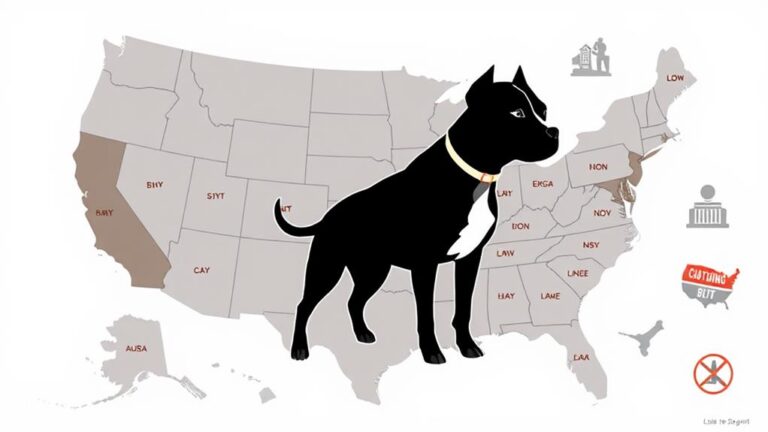Pit bulls aren't banned in many states like Washington, Illinois, Pennsylvania, and Oregon, which have no statewide laws against them. However, local rules can differ greatly. For example, Miami-Dade County in Florida has a strict ban on pit bulls. Some towns may need special permits or require muzzling in public. It's important to check local ordinances to know if there are restrictions in your area. Understanding these laws helps you be a responsible dog owner. If you want to learn more about this topic, there are other key points worth exploring.
Overview of Pit Bull Legislation
The landscape of pit bull legislation reveals a complex interplay of laws that can vary dramatically from one state or municipality to another.
In some states, like Washington, Illinois, Pennsylvania, and Oregon, there are no statewide bans on pit bulls. Instead, local laws might set their own rules about breed restrictions.
For instance, understanding local laws is crucial for responsible dog ownership, as you'll find that Washington is the most pet-friendly, scoring 81.7, while Illinois comes in at 69.4. Both Pennsylvania and Oregon follow closely with scores of 68.5.
It's important to check local ordinances because they can differ greatly, affecting what you can and can't do if you own a pit bull. Understanding these laws helps you be a responsible pet owner in your area.
States With No Bans
Several states across the U.S. have no bans on pit bulls, allowing responsible ownership of these breeds without fear of statewide restrictions.
For example, Washington, Illinois, Pennsylvania, and Oregon all welcome pit bulls without any statewide laws against them. This means you can own a pit bull in these states as long as you follow local laws.
In Washington, the pet-friendliness score is high, making it a great place for dog lovers.
Identifying purebred characteristics is essential for prospective owners to guarantee they're adopting a healthy and well-bred dog.
Illinois also ranks well, guaranteeing a supportive environment for pit bull owners.
In these states, you can enjoy your pet without worrying about breed-specific bans, as long as you provide proper training and care.
Local Ordinances on Pit Bulls
When considering bringing a pit bull into your home, it's vital to be aware of local ordinances that may affect ownership. These rules can vary widely by location, so you'll want to do your research.
Some areas might implement legislation in response to concerns about dog fighting, which can lead to bans or restrictions on breeds perceived as aggressive the impact of dog fighting.
Here are three key points to remember:
- Bans or Restrictions: Some cities or counties may have outright bans or specific restrictions on pit bulls.
- Registration Requirements: Certain areas might require you to register your pit bull or obtain special permits.
- Leash and Muzzle Laws: You could face laws that mandate leashing or muzzling your pit bull in public spaces.
Understanding these local ordinances will help facilitate a smoother experience as you welcome a pit bull into your family.
Notable Cities With Restrictions
Understanding local ordinances is just the beginning; you also need to be aware of specific cities that impose restrictions on pit bulls.
For instance, in Miami-Dade County, Florida, there's a strict ban on pit bulls, and this rule isn't changing. In some towns in Alberta, Canada, like Bearberry and Sundre, there are also restrictions in place.
Other cities may have rules that require pit bull owners to follow certain regulations, such as muzzling their dogs in public or obtaining special permits.
Always check your local laws, as they can vary greatly even within the same state. Staying informed will help you guarantee that you comply with the regulations and keep your pit bull safe and happy.
Comparison With Other Banned Breeds
The landscape of dog breed regulations often reveals a stark contrast between pit bulls and other breeds that face bans.
While pit bulls are often the center of debate, there are several other breeds that face similar restrictions.
Here's a quick comparison:
- Wolf Dogs: These hybrids are banned in many states due to their wild ancestry. Insurance companies often refuse coverage for them.
- Rottweilers: Some areas impose strict regulations on Rottweilers, citing their size and strength as concerns for safety.
- Doberman Pinschers: Like Rottweilers, Dobermans face restrictions due to their reputation, though many are friendly and well-trained.
Understanding these comparisons helps clarify why certain breeds are targeted while others are not.
Public Perception and Misconceptions
Despite their affectionate nature and suitability as family pets, pit bulls often face a cloud of misconceptions that shape public perception.
Many people think pit bulls are naturally aggressive, but this isn't true. Like any dog, a pit bull's behavior depends on training and socialization.
You might hear stories of bad experiences, but these often come from owners who didn't train their dogs properly. It's important to remember that any breed can show aggression if not cared for correctly.
In reality, pit bulls can be loving and loyal companions, especially with kids.
Conclusion
In summary, knowing the laws about pit bulls is important before bringing one home. Some states allow them without any restrictions, while others have strict rules or outright bans. Always check your local ordinances because they can vary even within the same state. By understanding these laws, you can guarantee a happy life for your new furry friend while staying within the law. Remember, responsible ownership starts with being informed!



